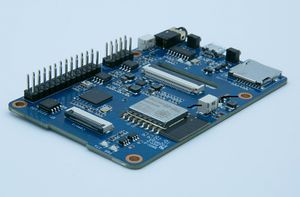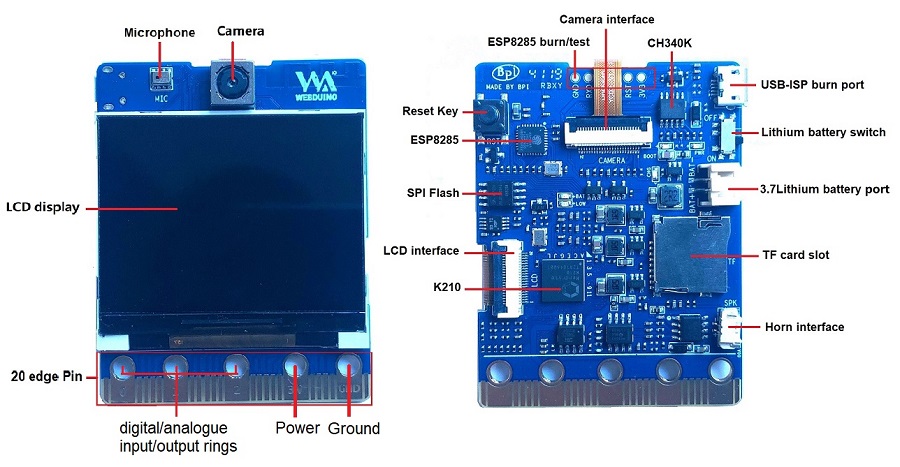Difference between revisions of "BPI-AI"
(→Documents) |
|||
| (18 intermediate revisions by 2 users not shown) | |||
| Line 2: | Line 2: | ||
[[File:BPI-AI_1.JPG|thumb|[[BPI-AI]] Kendryte K210 RISC-V]] | [[File:BPI-AI_1.JPG|thumb|[[BPI-AI]] Kendryte K210 RISC-V]] | ||
[[File:BPI-AI_2.JPG|thumb|[[BPI-AI]] Kendryte K210 RISC-V]] | [[File:BPI-AI_2.JPG|thumb|[[BPI-AI]] Kendryte K210 RISC-V]] | ||
| + | [[File:Leaf-S3-incline-front.jpg|thumb|[[BPI-Leaf-S3]] with ESP32-S3]] | ||
| + | [[File:Webduino_gif.gif|thumb|[[BPI-Bit]] with ESP32 design ]] | ||
| + | [[File:BPi-QCar_1.jpg|thumb|[[BPI Q-Car kit]] with BPI:AI board]] | ||
| + | [[File:Banana_PI_BPI-EAI80_5.JPG|thumb|[[BPI-EAI80 AI board]] Gree EAI80 chip design]] | ||
| + | [[File:BPI-K210_1.JPG|thumb|[[BPI-K210 RISC-V AIoT board]]]] | ||
| − | BPI-AI design with K210 RISC-V chip design.An integrated artificial intelligence SOC chip solution that can accommodate neural network models, using a new risc-v instruction set for the field of artificial intelligence and edge computing. The main target market is the AIoT and STEAM education market,it support screen and camera. so easy to do many AI application, cowork with Webduino team. and support Webduino blockly for STEAM education. | + | |
| + | BPI-AI(also name Web:AI for Webduino) design with K210 RISC-V chip design.An integrated artificial intelligence SOC chip solution that can accommodate neural network models, using a new risc-v instruction set for the field of artificial intelligence and edge computing. The main target market is the AIoT and STEAM education market,it support screen and camera. so easy to do many AI application, cowork with Webduino team. and support Webduino blockly for STEAM education. | ||
| + | also support Arduino IDE,MixPy | ||
==Type Applications== | ==Type Applications== | ||
| Line 22: | Line 29: | ||
*DMA | *DMA | ||
*Camera and screen interface | *Camera and screen interface | ||
| − | *WiFI | + | *WiFI (ESP8285) |
*JTAG, OpenOCD support | *JTAG, OpenOCD support | ||
| Line 36: | Line 43: | ||
==Hardware Interface== | ==Hardware Interface== | ||
| + | [[File:BPI-AI_interface.JPG]] | ||
| + | |||
| + | |||
| + | ==Hardware spec== | ||
| + | {| class="wikitable" | ||
| + | |- | ||
| + | | style="background: PaleTurquoise; color: black" colspan="4"| '''HardWare Specification of Banana pi BPI-AI (WEB:AI)''' | ||
| + | |- | ||
| + | |CPU|| Kendryte K210 64-bit RISC-V CPU Dual-Core, up to 400MHz,with neural processing unit (NPU) | ||
| + | |- | ||
| + | | Memory|| SPI flash and The accelerator has its own memory, with 6MB of static RAM given over to the dual-core CPU and a further 2MB for the NPU coprocessor. | ||
| + | |- | ||
| + | | camera||5 million pixel cameras | ||
| + | |- | ||
| + | | WIFI|| ESP8285 wifi module support 802.11.b/g/n | ||
| + | |- | ||
| + | |Audio Output(s)|| Built-in MEMS microphone supports 3W speaker output | ||
| + | |- | ||
| + | | LCD Screen|| 8bit MCU 2.3 LCD,DPI 320x240 | ||
| + | |- | ||
| + | | Socket|| Compatible with BPI: BIT Micro:bit Goldfinger,TF card ,Speaker,lithium battery interface | ||
| + | |- | ||
| + | |Development environment ||Arduino IDE, MaixPy IDE ,Webduino | ||
| + | |- | ||
| + | |Switches|| Reset, A/B key | ||
| + | |- | ||
| + | | Power Source||5volt@2A via Micro USB ,lithium battery interface(3.7-4.2V) | ||
| + | |- | ||
| + | |Size & Weight|| 51.6mm×67mm, 58g | ||
| + | |} | ||
| + | |||
| + | = BPI-AI software = | ||
| − | |||
==Source code on github== | ==Source code on github== | ||
K210 chip official Source code on github:https://github.com/kendryte | K210 chip official Source code on github:https://github.com/kendryte | ||
| + | |||
| + | Web:ai for maixpy : https://github.com/webduinoio/webai-maixpy | ||
| + | |||
| + | |||
| + | ==BPI:AI(Web:ai) for Webduino== | ||
| + | |||
| + | *Web:AI initialization Settings teaching : https://www.youtube.com/watch?v=ZSGkZUQQXcI | ||
=Documents= | =Documents= | ||
| Line 47: | Line 92: | ||
*K210 SDK(drive)、documents、compiler、OpenOCD Debugging software :https://kendryte.com/downloads/ | *K210 SDK(drive)、documents、compiler、OpenOCD Debugging software :https://kendryte.com/downloads/ | ||
*jacklab K210 wiki page : http://wiki.jackslab.org/K210 | *jacklab K210 wiki page : http://wiki.jackslab.org/K210 | ||
| + | |||
| + | =Support= | ||
| + | |||
| + | *if you want to order or do OEM&ODM please contact : [email protected] | ||
Latest revision as of 03:26, 18 March 2022
Contents
Introduction
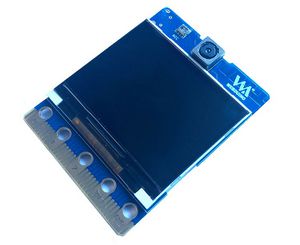
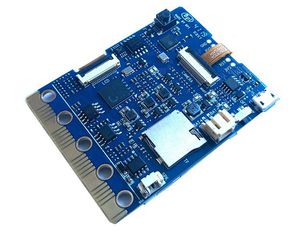
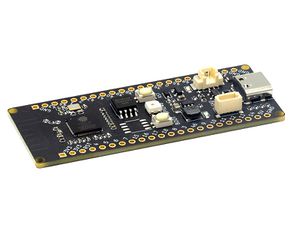
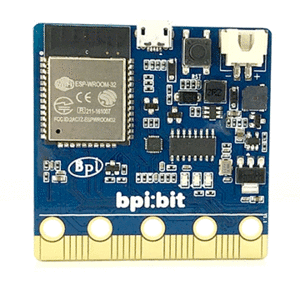
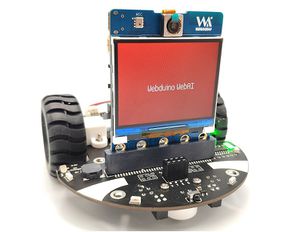
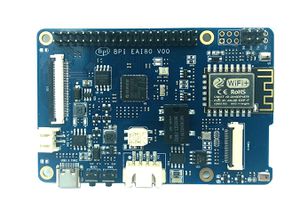
BPI-AI(also name Web:AI for Webduino) design with K210 RISC-V chip design.An integrated artificial intelligence SOC chip solution that can accommodate neural network models, using a new risc-v instruction set for the field of artificial intelligence and edge computing. The main target market is the AIoT and STEAM education market,it support screen and camera. so easy to do many AI application, cowork with Webduino team. and support Webduino blockly for STEAM education.
also support Arduino IDE,MixPy
Type Applications
- AI for Edge Computing
- Smart Building
- Medical equipment
- Automation & Process Control
- Robot
- IoT applications
- STEAM education
Key Features
- 64-bit RISC-V CPU Dual-Core, up to 400MHz
- IMAFDC (RV64GC) ISA extension
- Hardware FPU (Float Point Unit), Double Precision
- 32 KB I-Cache per core and 32 KB D-Cache per core
- 8MB On-Chip SRAM 128Kbit One-Time Programmable Memory (OTP) ,Read Only Memory (ROM)
- DMA
- Camera and screen interface
- WiFI (ESP8285)
- JTAG, OpenOCD support
About Kendryte K210 chip
The Kendryte K210 is a system-on-chip (SoC) that integrates machine vision and machine hearing. Using TSMC’s ultra-low-power 28nm advanced process with dual-core 64-bit processors for better power performance, stability and reliability. The program strives for zero threshold development and can be deployed in the user’s products in the shortest time, giving the product artificial intelligence.
The Kendryte K210 is located in the SoC of the AI and IoT markets and is a very convenient MCU.
Kendryte Chinese means surveying intelligence, while surveying intelligence is taken from surveying and searching. The main application field of this chip is in the field of Internet of Things, and it is developed in the field of Internet of Things. Therefore, this chip mainly provides artificial intelligence solutions, which are explored in the field of artificial intelligence.
BPI-AI hardware
Hardware Interface
Hardware spec
| HardWare Specification of Banana pi BPI-AI (WEB:AI) | |||
| CPU | Kendryte K210 64-bit RISC-V CPU Dual-Core, up to 400MHz,with neural processing unit (NPU) | ||
| Memory | SPI flash and The accelerator has its own memory, with 6MB of static RAM given over to the dual-core CPU and a further 2MB for the NPU coprocessor. | ||
| camera | 5 million pixel cameras | ||
| WIFI | ESP8285 wifi module support 802.11.b/g/n | ||
| Audio Output(s) | Built-in MEMS microphone supports 3W speaker output | ||
| LCD Screen | 8bit MCU 2.3 LCD,DPI 320x240 | ||
| Socket | Compatible with BPI: BIT Micro:bit Goldfinger,TF card ,Speaker,lithium battery interface | ||
| Development environment | Arduino IDE, MaixPy IDE ,Webduino | ||
| Switches | Reset, A/B key | ||
| Power Source | 5volt@2A via Micro USB ,lithium battery interface(3.7-4.2V) | ||
| Size & Weight | 51.6mm×67mm, 58g | ||
BPI-AI software
Source code on github
K210 chip official Source code on github:https://github.com/kendryte
Web:ai for maixpy : https://github.com/webduinoio/webai-maixpy
BPI:AI(Web:ai) for Webduino
- Web:AI initialization Settings teaching : https://www.youtube.com/watch?v=ZSGkZUQQXcI
Documents
- K210 chip datasheet(English):https://drive.google.com/file/d/1AavU-bCoyA2BWSDB3NQBp41A7CvdJvBL/view?usp=sharing
- K210 chip datasheet(Chinese):https://drive.google.com/file/d/1_xQ3waq4ENHIlfJ7ujrfRSAClNAk6beL/view?usp=sharing
- K210 SDK(drive)、documents、compiler、OpenOCD Debugging software :https://kendryte.com/downloads/
- jacklab K210 wiki page : http://wiki.jackslab.org/K210
Support
- if you want to order or do OEM&ODM please contact : [email protected]
